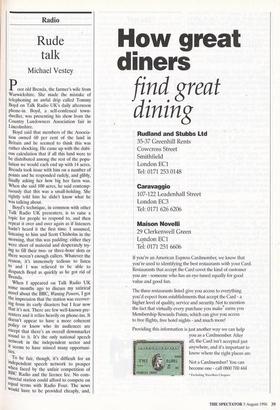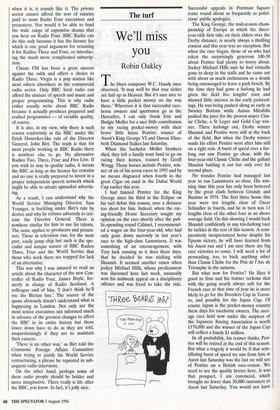Radio
Rude talk
Michael Vestey
Poor old Brenda, the farmer's wife from Warwickshire. She made the mistake of telephoning an awful drip called Tommy Boyd on Talk Radio UK's daily afternoon phone-in. Boyd, a self-confessed town- dweller, was presenting his show from the Country Landowners Association fair in Lincolnshire.
Boyd said that members of the Associa- tion owned 60 per cent of the land in Britain and he seemed to think this was rather shocking. He came up with the dubi- ous calculation that if all this land were to be distributed among the rest of the popu- lation we would each end up with 14 acres. Brenda took issue with him on a number of Points and he responded rudely, and glibly, finally asking her how big her farm was. When she said 100 acres, he said contemp- tuously that this was a small-holding. She rightly told him he didn't know what he was talking about.
Boyd's technique, in common with other Talk Radio UK presenters, is to raise a topic for people to respond to, and then repeat it over and over again as if listeners hadn't heard it the first time. I assumed, listening to him and Scott Chisholm in the morning, that this was padding: either they were short of material and desperately try- ing to fill their two- or three-hour slots or there weren't enough callers. Whatever the reason, it's immensely tedious to listen to and I was relieved to be able to despatch Boyd as quickly as he got rid of Brenda.
When I appeared on Talk Radio UK some months ago to discuss my satirical novel about the BBC, Waning Powers, I got the impression that the station was recover- ing from its early disasters but I fear now that it's not. There are few well-known pre- senters and it relies heavily on phone-ins. It doesn't appear to have a more coherent Policy or know who its audiences are except that there's an overall downmarket sound to it. It's the only national speech network in the independent sector and it seems to have missed many opportuni- ties.
To be fair, though, it's difficult for an independent speech network to prosper When faced by the unfair competition of BBC Radio and the licence fee. No com- mercial station could afford to compete on equal terms with Radio Four. The news would have to be provided cheaply, and,
when it is, it sounds like it. The private sector cannot afford the sort of salaries paid to most Radio Four executives and presenters. Nor would it be able to fund the wide range of expensive drama that you hear on Radio Four. BBC Radio can do this only because it has the licence fee which is one good argument for retaining it for Radios Three and Four, or introduc- ing the much more complicated subscrip- tion.
Classic FM has been a great success against the odds and offers a choice to Radio Three. Virgin is a pop station like most others elsewhere in the commercial radio sector. Only BBC local radio can afford the mixture of speech and music and proper programming. This is why radio critics usually write about BBC Radio because it actually produces prepared and crafted programmes — of variable quality, of course.
It is also, in my view, why there is such craven conformity at the BBC under the Erich Honecker-like rule of the Director General, John Dirt. The truth is that for most people working in BBC Radio there is nowhere else to go. No alternative Radios Two, Three, Four and Five Live. If you wish to stay in quality radio, it means the BBC as long as the licence fee remains and no one is really prepared to invest in a proper independent speech network which might be able to attract upmarket advertis- ing. As a result, I can understand why the World Service Managing Director, Sam Younger, is buckling under Birt's rule by decree and why he refuses adversely to crit- icise the Director General. There is nowhere similar for him to use his talents. The same applies to producers and presen- ters. Those in television can, for the most part, easily jump ship but such is the spe- cialist and unique nature of BBC Radios Three, Four and the World Service that those who work there are trapped for lack of an alternative.
This was why I was amused to read an article about the character of the new Con- troller of Radio Four, James Boyle, for- merly in charge of Radio Scotland. A colleague said of him, 'I don't think he'll toe the Birtian line.' The source of the quote obviously doesn't understand what is happening in London. Not only are the most senior executives not informed much in advance of the greatest changes to affect the BBC in its entire history but those lower down have to do as they are told, unquestioningly if they are to maintain their careers.
'There is no other way,' as flirt told the Commons Foreign Affairs Committee when trying to justify his World Service restructuring, a phrase he repeated in sub- sequent radio interviews.
On the other hand, perhaps some of these radio people should be bolder and more imaginative. There really is life after the BBC, you know. In fact, it's jolly nice.



















































 Previous page
Previous page